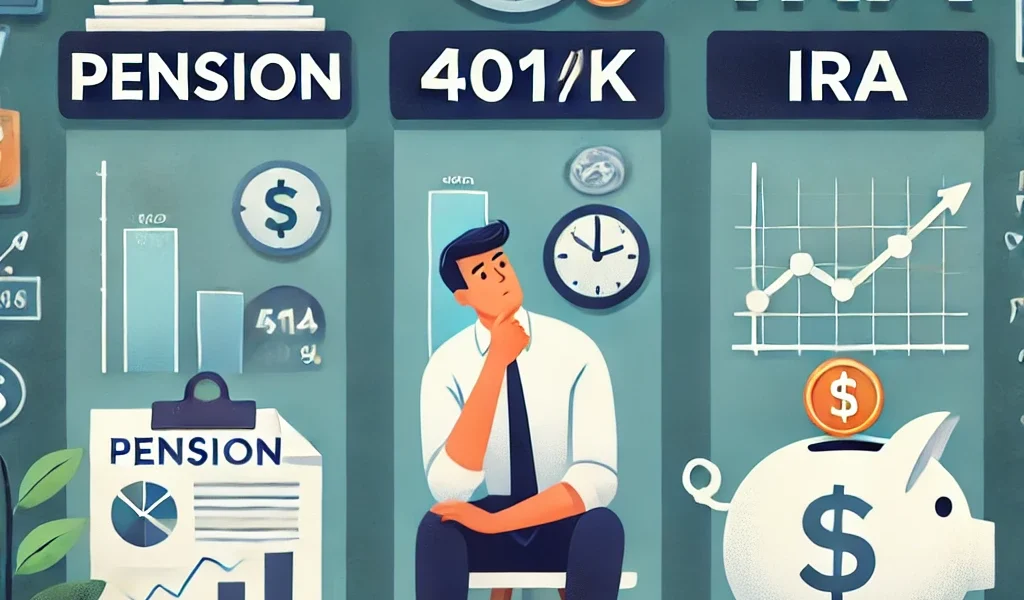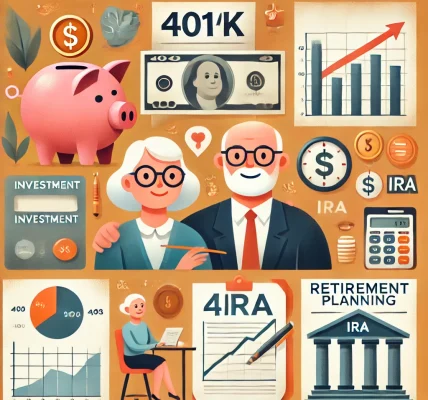Planning for retirement is one of the most important financial decisions you will ever make. With multiple retirement plans available, such as pensions, 401(k)s, and IRAs, it’s crucial to understand the differences and determine which plan best suits your needs.
In this comprehensive guide, we will compare pensions, 401(k)s, and IRAs in terms of structure, tax advantages, flexibility, and long-term benefits. By the end, you will have a clear understanding of which retirement plan aligns best with your financial goals.
Understanding the Basics of Retirement Plans
Before diving into the comparisons, let’s first define each type of retirement plan.
1. What is a Pension?
A pension (also known as a defined benefit plan) is a retirement plan funded and managed by an employer. Employees receive a fixed monthly income after retirement, based on salary history and years of service.
✅ Advantages of Pensions:
- Provides a guaranteed lifetime income.
- No need for employees to manage investments.
- Offers survivor benefits for spouses in many cases.
🚨 Disadvantages of Pensions:
- Becoming rare due to high costs for employers.
- Limited flexibility – payouts are predetermined.
- If the company goes bankrupt, pensions might be affected.
2. What is a 401(k)?
A 401(k) (or 403(b) for non-profits) is an employer-sponsored retirement plan where employees contribute a portion of their salary before taxes. Employers often match a percentage of employee contributions.
✅ Advantages of 401(k) Plans:
- Contributions are tax-deferred, reducing taxable income.
- Employers may offer a matching contribution (free money!).
- Higher contribution limits compared to IRAs.
🚨 Disadvantages of 401(k) Plans:
- Investment options are limited to employer-chosen funds.
- Withdrawals before age 59½ incur penalties and taxes.
- Required Minimum Distributions (RMDs) start at age 73.
3. What is an IRA?
An Individual Retirement Account (IRA) is a self-managed retirement plan that offers tax advantages. There are two main types: Traditional IRA (tax-deferred) and Roth IRA (tax-free withdrawals).
✅ Advantages of IRAs:
- Greater flexibility in choosing investments (stocks, bonds, ETFs, etc.).
- Roth IRA withdrawals in retirement are completely tax-free.
- No employer sponsorship required – anyone with income can open one.
🚨 Disadvantages of IRAs:
- Lower contribution limits compared to 401(k)s.
- No employer matching.
- Income limits may restrict Roth IRA contributions.
Key Differences: Pension vs. 401(k) vs. IRA
| Feature | Pension | 401(k) | IRA |
|---|---|---|---|
| Who Contributes? | Employer | Employee & Employer | Employee |
| Tax Benefits? | No direct tax benefits | Pre-tax contributions | Tax-deferred (Traditional) or tax-free (Roth) |
| Investment Control? | None (Employer manages) | Limited to employer’s offerings | Full control (stocks, bonds, ETFs, etc.) |
| Guaranteed Income? | Yes, for life | No, depends on market performance | No, depends on investments |
| Employer Matching? | No | Sometimes | No |
| Early Withdrawal Penalties? | Yes | Yes (before 59½) | Yes (before 59½) |
Which Retirement Plan is Best for You?
Now that you understand the differences, let’s break down which plan is best for different situations.
Best Option for Risk-Averse Individuals Seeking Guaranteed Income: Pension
- If you prefer stability and guaranteed income, a pension is the best choice.
- Ideal for government employees, union workers, and employees of large corporations offering pensions.
- However, if your employer does not offer a pension, you’ll need to rely on a 401(k) or IRA.
Best Option for Employees Wanting Employer Contributions & Tax Benefits: 401(k)
- If your employer offers a 401(k) match, take full advantage – it’s free money!
- Ideal for those who want higher contribution limits and don’t mind employer-chosen investments.
- Best for individuals comfortable with market-based growth and willing to manage investments over time.
Best Option for Self-Employed or Those Seeking Investment Control: IRA
- If you don’t have access to a 401(k), an IRA is a great alternative.
- A Roth IRA is ideal if you expect higher taxes in retirement since withdrawals are tax-free.
- Suitable for freelancers, entrepreneurs, or anyone seeking investment flexibility.
Can You Have Multiple Retirement Plans?
Yes! Many individuals benefit from combining multiple retirement plans for greater financial security. Here’s how:
- If your employer offers a 401(k) with matching, contribute at least up to the match.
- Open an IRA (Traditional or Roth) to supplement your savings and diversify tax advantages.
- If you have a pension, consider additional retirement savings options to hedge against potential pension reductions.
Final Thoughts: Making the Right Choice
Choosing the best retirement plan depends on your career, employer benefits, risk tolerance, and financial goals. Here’s a quick recap:
- Pension: Best for those seeking a stable, guaranteed income after retirement.
- 401(k): Ideal for employees wanting tax benefits, employer matching, and higher contribution limits.
- IRA: Perfect for self-employed individuals or those wanting more investment choices.
Pro Tip: Consult a Financial Advisor
A financial advisor can help you create a personalized retirement strategy based on your income, goals, and risk tolerance.




